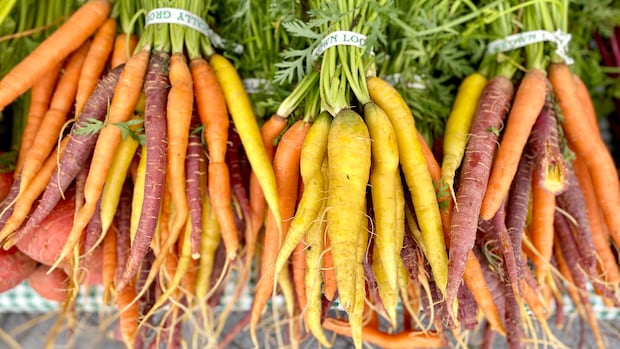N.S. drops local food strategy, raising concerns over production, access to healthy options
Strategy could have helped address food insecurity, mitigate risk of market disruptions, academic says

Some who work in or study the food and agriculture sector are raising concerns after it was recently revealed the Nova Scotia government quietly abandoned its plan to develop a local food strategy.
The Food and Beverage Strategy was aimed at improving access to and increasing production of healthy local food. A round of public consultation was done for the initiative in 2022.
On June 12, in response to a CBC reporter's question, Agriculture Minister Greg Morrow said the province wasn't moving forward with the initiative.
For Dalhousie University assistant professor Phoebe Stephens, the dropped strategy is a missed opportunity considering that Nova Scotia has among the highest rates of food insecurity in Canada.
"Improving access to healthy local food would go a really long way, especially for improving equity for low-income households, Black and Indigenous-led households," said Stephens, who studies sustainable food systems.
Morrow said the government is already acting on the public feedback collected, pointing to the school lunch program launched in 2024 and the Nova Scotia Loyal local food rewards program as examples.
CBC News previously asked the Department of Agriculture twice for an update on the strategy and did not hear back.

Stephens also said Nova Scotia lacks infrastructure for local food production. Improving that, as the strategy was intended to do, could help the province weather shocks to supply chains and markets.
"We're very much focused on exports at the moment, so that leaves us really vulnerable to fluctuations on the world market, commodity price fluctuations," said Stephens.
And "with our neighbour down south [the United States] being quite unpredictable, those are some real risks that we run in terms of, you know, not having … a more self-sufficient food system," she added.
Morrow said the province has supported local food hubs, like one in Cape Breton that provides infrastructure and distributes food from local producers to consumers and restaurants.
The province has also provided more than $850,000 to the Halifax Regional Food Hub, which is currently getting set up.
"I don't think we need a strategy to do the right thing," Morrow said on June 12. "We're acting."

Eli Milton, executive director of the Halifax food hub, said the decision to shelve the Food and Beverage Strategy leaves farmers "in a bit of a lurch" as to what the province will be doing.
A strategy "could increase access to markets, it could help us increase our local production," said Milton, who's also farmed in the province for the last eight years. "That's something we really need … with farms declining."
Nova Scotia's farming industry hasn't been profitable for nearly a decade, according to recent Statistics Canada data. The number of agriculture workers and farms has also declined.
The many small farms in Nova Scotia need more support to help distribute their food locally, Milton said.
"If you're a smaller farm, there's not as many options," she said. "There's the farmers' market, there's making connections with wholesale, restaurants, retailers."
"It's a lot of groundwork on people that are already working their max."
The Nova Scotia Federation of Agriculture is calling on the province to support and invest in an industry-led strategy aimed at addressing the long-term challenges farms face, said president Alicia King in a statement.
In a statement sent to CBC News after an extended deadline, the Department of Agriculture said the government has invested nearly $13.5 million in the agriculture industry so far this year, adding that there's more to come.
The department said that money is in addition to more than $9 million provided annually as part of programs that share costs with the federal government.
With files from Taryn Grant


